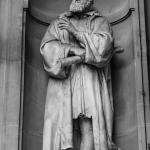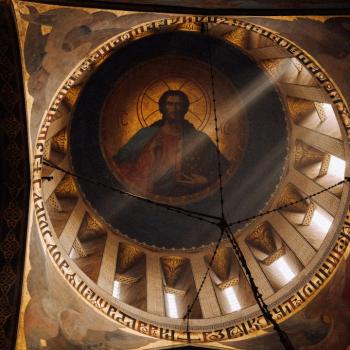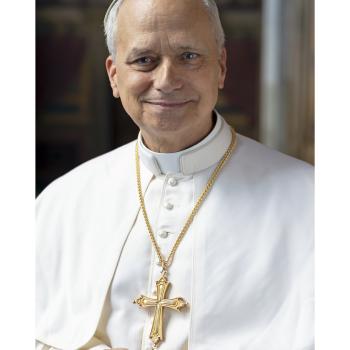Imagine you were sitting at a coffee shop and Jesus sat down in front of you. You can ask him anything in the world. Would you know what to say?
If you had one shot or one opportunity to seize everything you ever wanted in one moment, would you capture the moment or let it slip? (Eminem, “Lose Yourself”).
This is what I love about Bartimaeus. Bartimaeus is a blind man who encounters Jesus and asks him to see. He is blind and he knows that he wants to see. I think that we are also blind, metaphorically speaking. We should desire one thing and ask God incessantly for it: to see.
Losing Ourselves to Find Jesus
When we trust the promises of the world instead of the promise of Jesus, we are living blindly! Little things trap our attention and distract us from Jesus. Christ cannot be our center when we are in the center.
So much of our spiritual life is getting ourselves out of the center and putting Jesus there. We have to lose ourselves to find Jesus. The encounter between Bartimaeus and Jesus invites us to own the moment.
You better lose yourself in the music, the moment, you own it, you better never let it go (Eminem, “Lose Yourself”).
When Bartimaeus was in front of Jesus, nothing else mattered. He wanted to see and he wanted to meet Jesus. He knew that he needed Jesus, that he was the only one who could help him out of his blindness. When you learn to hang on to Jesus as if he were the only person who mattered, your faith will grow. Our problem is that we often do not recognize our need. As Christians, we talk a lot about the Good News, and rightly so. However, for many of us, we will never notice the value of the Gospel unless we recognize first the gravity of the Bad News. Without Jesus, this world lost in darkness holds onto us.

Doubts Against Faith
Our blindness can come on an intellectual level. We may often struggle with the faith. Doubts creep in, telling us that what the Church teaches is not real.
Voluntary doubt about the faith disregards or refuses to hold as true what God has revealed and the Church proposes for belief. Involuntary doubt refers to hesitation in believing, difficulty in overcoming objections connected with the faith, or also anxiety aroused by its obscurity. If deliberately cultivated doubt can lead to spiritual blindness (Catechism of the Catholic Church, 2088).
Bartimaeus was blind; he had an excuse not to see. On the other hand, our doubts often come from us choosing to keep our eyes closed. This is voluntary doubt. For example, if we read atheistic literature and listen to atheistic podcasts, but never nurture our souls with good spiritual reading, spiritual direction or prayer time, we are feeding into voluntary doubt. Involuntary doubt is natural and not sinful, yet still a sign that we should seek help to shore up our faith.
I remember listening to Richard Dawkins’ book The God Delusion. I disagree with his conclusions but I have to say that I realized spending so much time hearing objections to the existence of a good and loving God could be dangerous for my soul. Going forward, I made the resolution that for every minute I spent listening to atheistic arguments, I had to spend a minute reading the Bible.
Unconscious Rebellion
Beyond doubts about the truths of faith, blindness may additionally appear on a moral level. We can fall into the trap of an unconscious rebellion. So many people who decry the evils in the Church are unconsciously trying to hide their own moral struggles and failures. “The Church is out of touch with reality” can usually be understood as “I have moral failings and want the Church to say that there is nothing wrong with what I am doing.” This is usually not done consciously but is the thought process we are able to recognize if we examine the situation carefully. Furthermore, we miss the point of religion when we make our religion a “religion of one,” when we ascribe to the world religion of “me-ism.”
We do not really want a religion that is right where we are right. What we want is a religion that is right where we are wrong. We do not want, as the newspapers say, a church that will move with the world. We want a church that will move the world. (G.K. Chesterton)
Thankfully, our blindness has a cure. Once we recognize the Bad News that we are trapped in sin, we can open our hearts to the Good News of the Gospel.
Good News
The Good News is that we have a Savior. Jesus stopped when Bartimaeus called out. In the same way, he reaches out his hand to save each one of us. If we are willing, he can save us, heal us from our blindness, and send us out as apostles into the world.
We are called to go out into the world with a message of “I was blind, but now I see.” Now is the time to repent of past mistakes, sins, and failures, so you can accept the salvation that Christ is offering you. Listen to the words of Jesus and reply with the words of Bartimaeus.
“What do you want me to do for you?” The blind man replied to him, “Master, I want to see.” (Mk. 10:51).
Subscribe to the newsletter to never miss an article.












